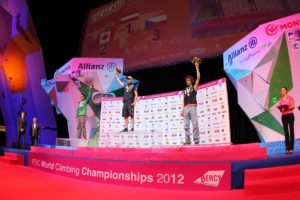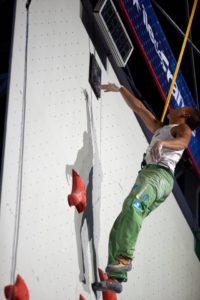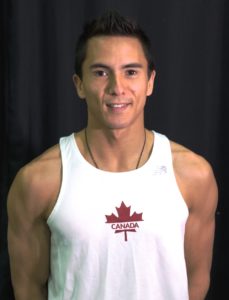Explore/Past Posts
Newsletter Sign Up
Finding my Apex – Sean McColl
By: Guest Writer, Sean McColl
With my path now firmly set on the 2020 Olympic Games, training for speed climbing becomes more and more important. My time needs to get faster and to do this I need more repetitions, more consistency, and more time on the competition Speed wall. I am the only competitor in the history of IFSC to finish in the top eight of all three disciplines and I want nothing more than to share the Olympic stage with the world’s top climbing athletes.
When It All Started
I started climbing when I was 10 years old and like many climbers today, went with my family to a local climbing gym near my home in North Vancouver. A few months into climbing, I was approached by the head coach of the junior team, Andrew Wilson, who asked if I wanted to join and train with kids my own age. That was the beginning of my climbing career.
By age 12, I had redpointed my first 5.14 (Pulse, Cheakamus Canyon, Squamish) and by age 13 I was headed to my first Youth World Championships in Imst, Austria. As every other Canadian on the Youth team, I had only trained for Lead, but in Austria there was this other event Speed and some of us were eager to compete. This was before the Speed route was standardized and you were timed based on a random route specific to the competition. I remember while looking up at the speed route, I saw a potential all points off dyno that landed on the last hold putting me in striking distance of the buzzer. I asked my coach if he thought I could make it, and in his assuring way he simply replied with a “Yes”. I ran up the route and I nailed the jump and beat the number one ranked Russian by a couple of seconds.
That moment of exhilaration was soon checked when in round 16, I tried the same jump but missed the buzzer, ending my competition. What I found out a few years later is that just after I tied in for the run where I pushed past the number one ranked climber, my coach, after assuredly telling me I could make the dyno, looked back at Andrew Wilson and said “he’ll never make that jump”. What neither of us knew at the time is that his affirmation that I could make that move on that route and on that day would set me on a path to Speed gold.
First Gold in Speed
Fast forward a year later, having still not trained a day of Speed climbing in my life, I walked away with a Youth World Championship gold medal in Speed at Canteleu, France. My return to Austria in 2006 for the Youth World Championships provided redemption as I took home another gold medal in the Speed event in addition to winning gold in lead climbing giving me the double win in my final competition as a junior.
The 2007 competition year was my first competing as an adult and also the first time I saw the standardized Speed route. World Championships were in Aviles, Spain and I registered in all 3 disciplines. After competing in bouldering and narrowly missing semi-finals (finished 25th), I was too scared to try the Speed route and decided to save my energy for Lead climbing. After not competing in Speed for the 2007 World Championships, I returned in 2009 and although my speed was still pretty atrocious, my performance in lead (5th) and boulder (6th) secured my first adult world championship gold medal!
World Championship Golds
Not yet committing to specifically train for Speed, my speed climbing continued to progress. I won my second gold medal at the 2012 World Championships in Paris, but it was again my lead and bouldering results that carried me to that win. I placed 4th in bouldering (missing the podium by one fall) and finished the exhaustive weekend with a flawless run on the lead route, finishing 2nd in that event. It wasn’t until 2014 that I really started to train for Speed climbing. I put aside a handful of days mostly to get my sequence sorted. I knew then that Speed would play a more and more important role in the overall World Cup rankings.

At the 2014 World Championships in Gijon, Spain I set a personal best of 8.28sec on the Speed wall. This time, Speed was the critical factor in taking home my third World Championship gold medal. Later in 2015, I set another personal best at the Canadian Speed World Cup in Central Saanich. After making the round of 16 in last place, I raced Libor Hroza (another Perfect Descent ambassador) from the Czech Republic. Although it was an easy win for Hroza, the unexpected happened and he fell on his run, giving me the win. After losing in the round of 8, I beat one other competitor and finished 7th.
I scored another (and my current) personal best on the Speed wall in 2016 at the world cup in Chongqing, China, racing up the wall in 7.82sec. I got my 4th Gold medal in Chongqing, after an exhaustive 5 days of multiple discipline rounds. It was a very tight battle with French competitor Manu Cornu but in the end, I walked away victorious.
2016 brought change to the Speed wall when the IFSC announced that Perfect Descent would be the official auto belay of IFSC Speed World Cup competition. This was a change that competitors had wanted for a few seasons and it didn’t take long for Speed competitors to embrace this change. Traditional belaying on the Speed wall is difficult to manage, requires a lot of open space, and is prone to human errors that can result in accidents. In the same way holds in Speed were standardized to create a fairer field-of-play, Perfect Descent auto belays make every Speed route feel the same.
On the eve of the 2018 World Championships in Innsbruck, Austria and with the debut of climbing in the 2020 Tokyo Olympics, I feel confident I am on the right path to Olympic gold. I am focused, I am strong, and I am within sight of the apex of my performance. If you ask my coach today if he thinks I will make, he will most likely answer with a simple and assuring “Yes”. I look forward to proving him right again.
Canadian professional climber Sean McColl

About Sean McColl
Sean McColl holds the title of 4x Overall World Champion (2009, 2012, 2014, 2016). He is the only Climbing World Cup competitor to be in the top 8 in every discipline and has stood atop the World Cup podium 32 times in his 19-year career. The Canadian attributes his success to an intense dedication to training for each of the three sport climbing disciplines. Sean has now focused that dedication on being among the first sport climbing Olympic medalists.
